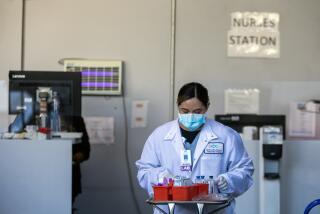California loosens nursing student rules in response to coronavirus crisis
Thousands of California nursing students will be able to join the state’s battle against the coronavirus pandemic in the coming months after regulators loosened training requirements that would have otherwise kept them from graduating.
California Department of Consumer Affairs Director Kimberly Kirchmeyer announced the emergency waiver Friday night, saying the state expects the change will help 9,000 nursing students meet their clinical training requirements. Nursing schools had for weeks pleaded with state officials to reduce the number of hours their students are required to train in hospitals after many clinical rotations were canceled as a result of the coronavirus outbreak.
“We are sympathetic to the predicament nursing students are in during this time of uncertainty,” Kirchmeyer said in a written statement. “It was necessary to waive these requirements to meet the ongoing needs of California’s health care system and allow nursing students to graduate on time.”
Gov. Gavin Newsom said California will need 50,000 additional hospital beds and many more healthcare workers to handle the rising number of COVID-19 patients. The state has seen dramatic increases in the number of confirmed cases and deaths due to the novel coronavirus in recent days and health officials said on Friday that several more challenging weeks lie ahead.
Los Angeles County is expecting to see 1,000 new COVID-19 cases a day in the coming weeks, said Barbara Ferrer, director of the county public health department.
Nursing school leaders said that quickly getting students working in hospitals is an essential part of meeting the state’s anticipated demand.
“This is fantastic news for thousands of nursing students in our community colleges,” said Dianne Van Hook, the chancellor of College of the Canyons. “This change eliminates weeks of waiting and uncertainty and will ensure our student nurses can get where they want to go, to hospitals and healthcare facilities where they can use their skills and training to serve Californians impacted by the coronavirus.”
Until now, nursing schools said their calls for regulatory changes were met with silence. That left nursing student Ryane Panasewicz wanting to help battle the pandemic but unsure she would be licensed to do so. Now, she said she’s hopeful that the change will mean she’s able to graduate in the coming weeks.
“I am beyond grateful,” Panasewicz said.
The state will temporarily allow nursing students to have equal parts simulated and in-hospital training under the changes announced Friday. California normally requires 75% of a nursing student’s clinical education to be in a hospital, with the remaining 25% allowed to be taught through a simulation.
Some hospitals under lockdown orders, however, have barred the student clinical training programs in an effort to reduce the risk of spreading the virus to students or patients. Without the ability to log hospital training hours, thousands of nursing students were in jeopardy of not graduating in the next few months.
Nursing schools argue that temporarily relaxing the rules on how much time a student must spend in a hospital rotation will not come at a cost to patients. A 2014 study by the National Council of State Boards of Nursing showed no significant difference in learning or clinical performance between students who spend 25% of their clinical education in simulations and those who do so 50% of the time.
Several states, including New York, Texas and Florida already permit nursing students to be trained in equal parts simulation and in-hospital rotations. With states scrambling to increase their healthcare workforce, some states are now allowing the majority of training hours to be completed through simulations. Other states have issued temporary licenses to nursing students.
Scott Casanover, senior vice president of governmental affairs for West Coast University and American Career College, which operates nursing schools in Anaheim, Los Angeles and Ontario, said other states are still doing more than California.
“While this is welcome relief to nursing students, it does not go nearly far enough,” Casanover said.
Casanover said California’s changes will help only students who are close to graduation, not those still unable to find even the reduced number of hours in hospitals. He said less than 10% of the clinical training rotations on which West Coast University and American Career College rely are still accepting students.
“With conservative predictions estimating that the pandemic will last through May, hospitals will not be able to schedule enough shifts for all nursing students in the state to complete their clinical hours,” Casanover said. “This policy is going to result in a severe backlog in nursing graduates.”
More to Read
Sign up for Essential California
The most important California stories and recommendations in your inbox every morning.
You may occasionally receive promotional content from the Los Angeles Times.











